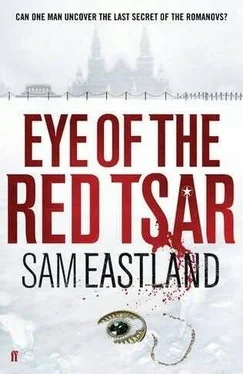“In his cell,” replied the attendant.
Pekkala jerked his head towards the door. “Show me,” he said.
The attendant led them to Katamidze’s cell.
“Where do you use lye in this building?” asked Pekkala, striding ahead.
“In the gardens sometimes.” The attendant’s legs were shorter than Pekkala’s. He was struggling to keep up with Pekkala. “We use it to clear out the drainpipes a couple of times a year.”
“Was he dead when you found him?”
“Almost. I mean he died before we had a chance to unlock him.”
“Did he say anything?”
“No. I mean…”
“What do you mean?” demanded Pekkala.
The attendant became flustered. “For God’s sake, his insides were burned out. Whatever he tried to say, the poor bastard was too far gone for us to understand. Here. This is the place.”
An orderly was mopping out the room. The air was thick with the smell of bleach, mingled with a reek of vomit and the piercing bitterness of lye. The cell had no windows, only a metal cot which folded up into the wall. There was no other furniture. A chain bolted into the wall hung down to the center of the cot. An iron cuff dangled from the chain.
Pekkala lifted the chain, then let it fall again. The metal links rattled against the wall. “He was locked to this?”
Anton’s breathing had grown shallow. Suddenly, he left the room; his hurried footsteps faded away down the corridor.
The attendant watched him go. “Some people have no stomach for a place like this,” he said.
Kirov remained where he was, peering over Pekkala’s shoulder.
“All inmates are locked to their bunks after lights-out,” the attendant explained. “During the day, the beds are folded up and the cuffs are released.”
“What happens to the prisoners then?”
The orderly continued swabbing the floor as if the men were not there.
“Prisoners are allowed out for fifteen minutes a day. The rest of the time, they sit on the floor, or they walk around their cells.”
“So you think he drank the lye before you chained him up for the night?”
The attendant nodded. “Yes. That’s the only possibility.”
Pekkala brought his face close to the attendant’s. “You know damned well this was no suicide.”
The orderly’s mop came to a sudden halt. From the twisted gray strands, sudsy water sluiced across the floor.
“Out,” said the attendant.
The orderly dropped his mop and scurried out of the room.
“Somebody gripped Katamidze’s neck,” Pekkala said.
“He scratched at himself. He was out of his mind.”
“There were other marks. Pressure marks. Somebody had him by the throat. His esophagus was damaged.”
“The lye…”
“Something had been pushed down there, probably a funnel of some sort. Then the lye was emptied into his stomach.”
The attendant had begun to sweat. He set his hand against his forehead and looked down at the floor. “Look, Inspector, in the end, does it really matter if he killed himself or not?”
“Of course it matters!” shouted Pekkala.
“What I mean is,” explained the attendant, “this is a house of madmen. Fights break out. Feuds go on which have no end and no beginning. These men have been removed from the world so that they can no longer be a danger to society, but that does not stop them from being a danger to each other. There is only so much we can do-”
“Why did you try to persuade me it was suicide?”
“A suicide”-the attendant’s hand flowed outwards, as if to ease the words out of his mouth-“requires only an internal investigation. But a murder needs a full-blown inquiry. Inspector, you know what that means. Men who are innocent, who are only trying to do a difficult job, will find themselves condemned as criminals. If there was any way that we could keep this quiet-”
“Were any intruders reported in the building?”
“Our security is designed to keep people in, not to keep them out.”
“So you are saying that anyone could walk in here and gain access to the inmates?”
“They’d have to get past me first,” the attendant replied, “or whoever else was on duty.”
“And is the front desk ever unattended?”
“Not officially.”
“What does that mean?” Pekkala snapped.
“It means that sometimes we have to answer the call of nature, if you know what I mean. Or we step out for a cigarette. Or we go to the cafeteria to grab a bowl of soup. If no one’s at the desk, all a person has to do is ring the buzzer and we come and get them.”
“But if no one was here, they could get hold of a key.”
The attendant shrugged. “Not officially.”
“In other words, yes.”
“There is a whole cabinet of entrance keys. Everyone who works in the asylum has one. They pick up the key when they arrive and they drop it off again when they leave. Each person’s key hangs on a peg with a number which corresponds to that person.”
“And is the cabinet locked?”
“Officially…”
“Don’t.”
“It should be, but sometimes it isn’t. But look, it’s like I said, this place is meant to keep people inside. An inmate trying to escape has to get out of his cell, which is locked, and through this door, which is also locked. People don’t break into asylums.”
“Do you know of anyone here who might have hated Katamidze enough to kill him?”
“Inspector, the inmates in this place do not need a reason for killing. That’s why they are in Vodovenko. And if you are telling me he was strangled, why go to the trouble of pouring lye down his throat?”
“To make it look like the work of a madman,” Pekkala answered, “so that no one would suspect a person from outside the asylum.”
“Wouldn’t it be simpler to believe that it actually was someone in here?”
Pekkala thought of Occam’s razor. “It might be simpler, but it wouldn’t be the truth. He had something to tell us, and somebody got to him first.”
Pekkala went out into the corridor.
The attendant followed him. He caught Pekkala’s sleeve. “Why would someone from outside break into this place and kill a wretch like Katamidze?”
“He knew a name.”
“Just a name? He died for that?”
“He would not be the first,” said Pekkala. Then he started walking for the door.
On Pekkala’s seventy-fifth day in the Butyrka prison, two guards strapped him to a plank. They tilted him so that his feet were above the level of his head and threw a wet towel over his face. Then one of the guards poured water onto the towel until he could not breathe and his mind became convinced that he was drowning.
He did not know how long this went on.
He had fallen into a place inside his mind which he had not known existed until that moment. With everything they had done to him until then, his conscious mind had balanced the information they were looking for against the pain they were causing him. His task became to keep the scales from tipping. But as he drowned beneath the towel, the scales disappeared completely and something unconscious took over. A terrible blackness, tinged with dusty red, spread out like a cloud through his brain and he no longer knew who he was, or what he cared about. Nothing mattered except staying alive.
When they removed the towel from his face, he spoke the name they had been asking. He had not intended to say it. The name almost seemed to speak itself.
Pekkala was returned to his cell immediately.
When the cell door closed, Pekkala wept. He held his hand over his mouth to stop the noise. Despair opened like a chasm before him. Tears ran over his knuckles. When the crying stopped, he realized he was going to die.
The following day, when the guards arrived, he allowed himself to be guided past the corridor of chimney cells until they reached an empty room. The floor was wet. The space could not have been more than a few yards wide and long, but it seemed so vast after living in the chimney that Pekkala’s first reaction was to press himself up against the wall, as if he had been led to the edge of a cliff.
Читать дальше










